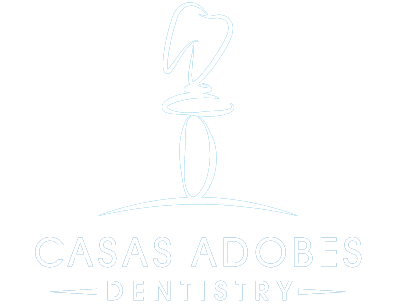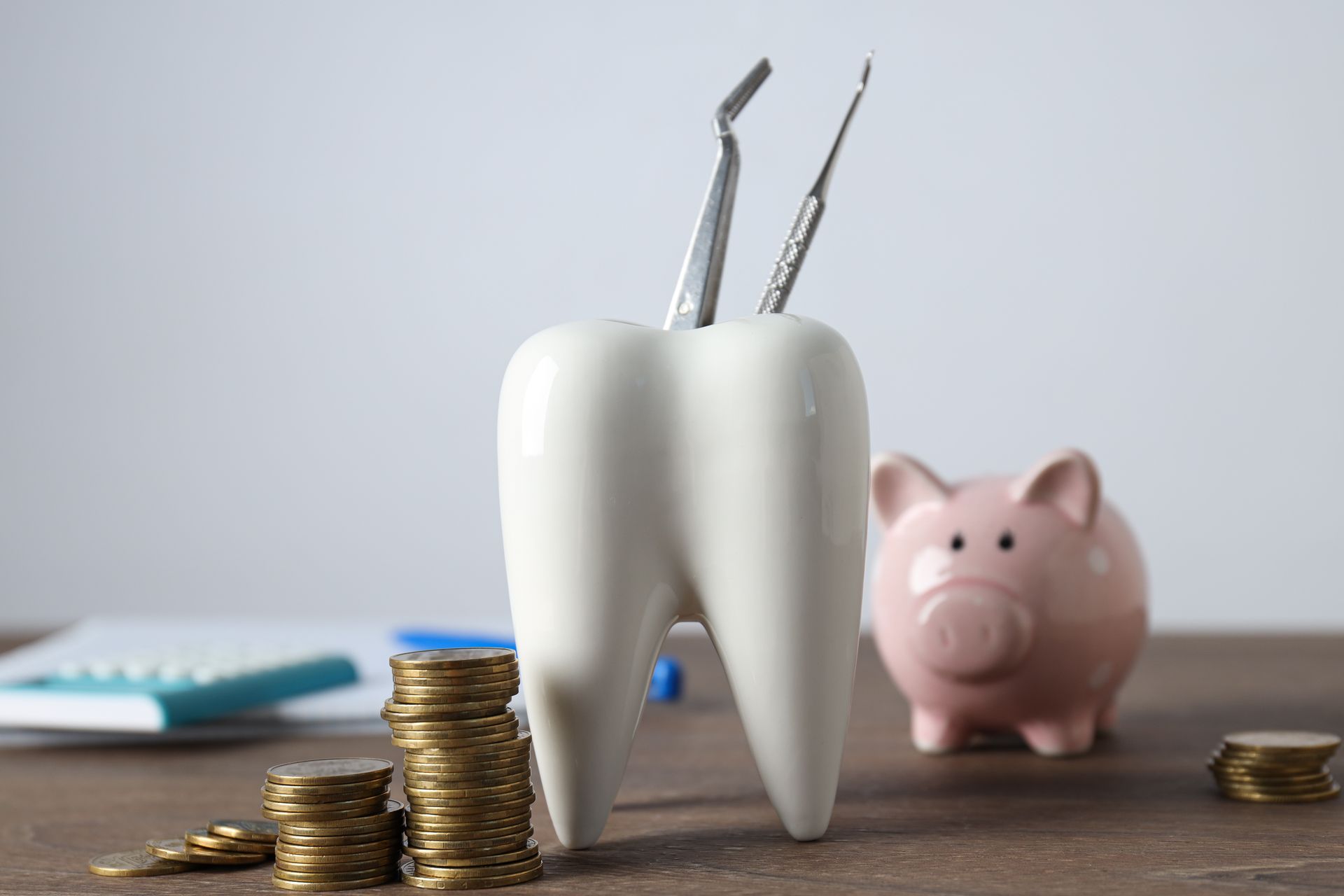Dentures vs Dental Implants in Tucson: Which Is Better for You?

At Casas Adobes Dentistry in Tucson, our dentists have spent many years helping patients replace missing teeth with dentures, implant supported dentures, and dental implants. Every day we see what works well for different people, and we understand the real-life pros and cons of each option. In this guide, we’ll give you clear, honest answers upfront so you can compare dentures vs dental implants in Tucson and feel confident about your choice.
Understanding Your Tooth Replacement Options
What Are Dentures?
Dentures are removable dental prosthetics that replace several missing teeth or a full arch of teeth.
- Full dentures replace all the teeth on your upper or lower jaw.
- Partial dentures clip around your remaining natural teeth to fill in gaps.
Dentures sit on top of your gums. They are made from acrylic and sometimes metal. Because they are removable, you take them out at night and clean them daily.
Dentures can be a good option if you need to replace many teeth quickly and want a more affordable tooth replacement upfront.
What Are Dental Implants?
Dental implants are a permanent tooth replacement option. An implant is a small titanium post that a dentist or specialist places in your jawbone. Over time, the bone grows around it and holds it in place. Then a crown, bridge, or denture is attached to the implant.
Implants can be used to replace:
- A
single tooth
- Several teeth with a bridge
- All teeth with
implant supported dentures
Because implants sit in the bone, they help with jawbone preservation and support your facial structure, which can prevent a “sunken” look over time.

Key Differences Between Dentures and Implants
Procedure & Placement
- Dentures:
- Usually do
not require surgery.
- Impressions are taken, teeth may be removed, and the denture is made in a lab.
- The process is generally faster and simpler.
- Dental Implants:
- Require
dental implant surgery to place the posts into the jawbone.
- Healing can take several months while the implant bonds with the bone.
- After healing, a crown or denture is attached.
If you want the quickest solution, dentures may be faster. If you’re willing to go through a longer process for a more stable result, implants may be better.
Appearance and Fit
Modern dentures can look very natural, but they rest on the gums and can shift slightly. Some people worry about them slipping while talking or laughing.
Dental implants, and fixed dental implant restorations, are anchored to the bone. They look and feel more like natural teeth and usually offer better denture stability when used with implant supported dentures.
Comfort and Functionality
- Dentures:
- May rub or cause sore spots, especially at first.
- Can make some foods harder to chew.
- May affect how you taste food if they cover the palate.
- Dental Implants:
- Often provide
better chewing efficiency, closer to natural teeth.
- Don’t move when you eat or speak.
Most patients find implants more comfortable in daily life, though the initial process is more involved.
Longevity and Maintenance
- Dentures:
- Usually need to be
relined or replaced every 5–10 years as the jawbone changes.
- Must be removed and cleaned every day.
- Dental Implants:
- With good care, implants can
last many years or even decades.
- You brush and floss them much like natural teeth.
From a long term oral health standpoint, implants are designed as a lasting solution, while dentures often need more frequent replacement and adjustment.
Pros and Cons of Dentures
Advantages of Dentures
- Lower
upfront cost compared with dental implants.
- No surgery required, which is helpful for some medical conditions.
- Can replace many missing teeth at once.
- Good option if bone loss is severe and implants are not possible.
Limitations of Dentures
- Can feel bulky or loose, especially lower dentures.
- May make it harder to eat certain foods like steak or crunchy vegetables.
- Do not prevent bone loss; the jawbone can continue to shrink over time.
- May need adhesives for better stability.
Pros and Cons of Dental Implants
Advantages of Implants
- Provide a
permanent tooth replacement when well cared for.
- Help with
jawbone preservation, reducing bone loss.
- Support your
facial structure and smile.
- Often make eating and speaking easier and more natural.
- Do not rely on neighboring teeth, which helps protect them.
Limitations of Implants
- Higher
upfront cost than traditional dentures.
- Require surgery and healing time.
- You must have enough healthy bone and good overall health.
- Smoking and some medical conditions can affect healing.
Comparing Costs: Dentures vs Dental Implants in Tucson
Upfront Costs
In general, traditional dentures are the most affordable tooth replacement option at the beginning.
Dental implants and implant supported dentures Tucson usually cost more up front because they involve surgery, high-quality materials, and multiple visits. The exact cost of dental implants in Tucson depends on:
- Number of teeth being replaced
- Need for bone grafting or other procedures
- Type of restoration (single crown, bridge, or full arch)
Long-Term Investment Considerations
While dentures may be less expensive at first, they often need to be repaired, relined, or replaced over the years. Ongoing bone loss can also lead to fit problems and more dental work.
Implants, on the other hand, are designed as a long-term investment in your oral health. They help protect bone and can reduce the need for future denture adjustments. For many patients, this makes implants a smart choice over time, even though the cost difference dentures vs implants in Tucson is higher at the start.
Insurance and Financing Options
Dental insurance may cover:
- Part of the cost of dentures
- Some parts of implant treatment, such as crowns or dentures
Coverage varies by plan, so it’s important to check your benefits. Many Tucson dental offices, including ours, offer payment plans or financing to make both dentures and implants more affordable.
Which Option Is Right for You?
Health and Bone Density Requirements
Dental implants need:
- Healthy gums
- Enough jawbone to hold the implant
If you have already lost a lot of bone, implants may still be possible with grafting, but this adds time and cost. In some cases, dentures or implant supported dentures may be the better choice.
Lifestyle and Daily Use
Think about how you want to live day to day:
- If you prefer a
removable option and don’t mind taking your teeth out at night, dentures may work well.
- If you want teeth that
stay in place and feel more like natural teeth, implants are usually the better match.
Budget and Long-Term Goals
Your budget is important, but so are your long-term goals. Ask yourself:
- Am I looking for the
least expensive solution right now?
- Or do I want a
long-term solution that may cost more upfront but last longer?
A thorough exam and honest cost estimate from a Tucson dentist will help you compare options clearly.
Final Thoughts on Choosing the Right Tooth Replacement
Consult with a Tucson Dental Expert
No article can fully replace an in-person exam. At Casas Adobes Dentistry, we look at:
- Your overall health
- Your bone levels
- Your smile goals and lifestyle
Then we explain your options for dentures, implant supported dentures, and dental implants in simple language so you can choose what feels right for you.
Consider Your Personal Priorities
The “best” choice depends on you: your health, your comfort, your budget, and how you want to live every day. Take time to think about what matters most, stability, speed, cost, or long-term results.
If you're wondering whether dentures or dental implants in Tucson are right for you, the next step is a personal evaluation.
Contact Casas Adobes Dentistry to schedule a tooth replacement consultation. We'll review your options, answer your questions honestly, and help you choose a solution that fits your smile and your life.

Frequently Asked Questions
Can I switch from dentures to dental implants later?
Yes, many patients start with dentures and later choose to upgrade to dental implants or implant-supported dentures. However, long-term denture use can lead to bone loss, which may require bone grafting before implants can be placed. The sooner you consider implants after tooth loss, the more likely you are to have sufficient bone density without additional procedures.
How painful is the dental implant process compared to getting dentures?
Getting dentures typically involves minimal discomfort, though some people experience sore spots as they adjust. Dental implant surgery requires local anesthesia and involves some post-operative soreness for a few days, manageable with over-the-counter pain medication. Most patients report the discomfort is less than expected and well worth the long-term benefits of stable, permanent teeth.
Will people be able to tell I have dentures or implants?
Modern dentures can look quite natural, though they may occasionally shift when eating or speaking. Dental implants are virtually indistinguishable from natural teeth because they're anchored in your jawbone and don't move. They also help maintain your facial structure, preventing the sunken appearance that can develop with dentures over time.
How long do I have to wait after tooth extraction to get dentures or implants?
With dentures, you can often receive immediate dentures on the same day as your extractions, though these will need adjustment as your gums heal. For dental implants, most dentists recommend waiting 3-6 months after extraction to allow complete bone healing, ensuring the best foundation for the implant. In some cases, immediate implant placement is possible.
Are dental implants worth the extra cost?
For many patients, yes. While implants cost more initially, they often prove more economical over 10-20 years because they don't require replacement or frequent adjustments like dentures. Beyond cost, implants preserve your jawbone, provide superior chewing function, and offer the confidence of teeth that never slip. The "worth" ultimately depends on your budget, health, lifestyle priorities, and how long you expect to use your tooth replacement.







